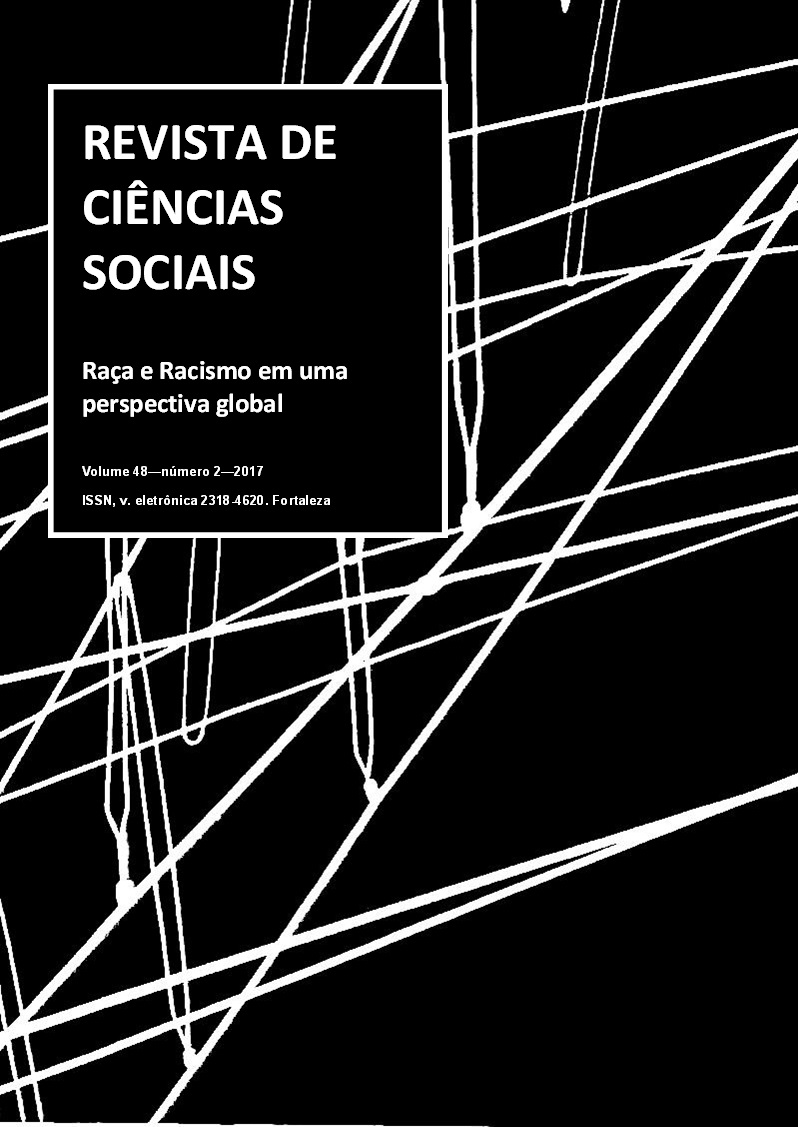Abdias do Nascimento and the Afro-diasporic Intellectual Tradition: combatting Racism
Keywords:
Black Movements in Brazil, Activism Against Racism in Brazil, Abdias do Nascimento, Transnational Black Activism, QuilombismAbstract
This essay examines how African-American visitors to Brazil wrote and thought about that country’s racial situation over the course of the 1900s. During the first half of the century, African-American visitors were more likely to see Brazil as a successful racial democracy, a society in which blacks, browns, and whites lived together on conditions of racial harmony and equality. During the second half of the century, African-American views of Brazil became much more critical, with some writers arguing that the ideology of racial democracy was itself a principal obstacle to the achievement of genuine racial equality. The article argues that this shift in views was in large part a reflection of African-Americans’ judgments about their own society. During the first half of the century, racial violence and oppression were so extreme in the United States that Brazil looked good by comparison. As the United States turned away from racial segregation in the second half of the century and adopted policies aimed at reducing racial inequality, AfricanAmericans became increasingly critical of Brazil’s failure to adopt similar policies or to follow US-based models of black political mobilization.References
ALMADA, Sandra. Abdias Nascimento. São Paulo: Selo
Negro, 2009.
BONILLA-SILVA, Eduardo. Racism Without Racists: ColorBlind
Racism and the Persistance of Racial Inequality in the
United States. Lanham, Maryland: Rowman & Littlefield,
BUTLER, Kim D. Up From Slavery: Afro-Brazilian Activism
in São Paulo, 1888-1938. The Americas, 49, n. 2, 1992, pp.
-206.
CAMARGO, Aguinaldo. The Negro Theatre in Brazil.
Americas, n.1, 1949.
CLAVIN, Matthew J. Toussaint Louverture and the American
Civil War: the promise and Peril of a Second Haitian
Revolution. Filadélfia: University of Pennsylvania Press, 2009.
DIOP, Cheikh Anta. Civilization or Barbarism: an Authentic
Anthropology. Brooklyn, NY: Lawrence Hill Books, 1991.
DU BOIS, W. E. B. The World and Africa; an Inquiry into the
Part Which Africa has Played in World History, by W.E.
Burghardt Du Bois. Nova York: Viking Press, 1947.
EARLY, Gerald Lyn. Lure and Loathing: Essays on Race,
Identity, and the Ambivalence of Assimilation. Nova York: A.
Lane/Penguin Press, 1993.
GILROY, Paul. The Black Atlantic: Modernity and Double
Consciousness. Cambridge, MA: Harvard University Press,
MARABLE, Manning; AGARD-JONES, Vanessa.
Transnational Blackness: Navigating the Global Color line.
Basingstoke: Palgrave Macmillan, 2009.
MAYES, Keith A. Kwanzaa: Black Power and the Making of
the African-American Holiday Tradition. Nova York:
Routledge, 2009.
MOSES, Wilson Jeremiah. Afrotopia the Roots of African
American Popular History. Nova York: Cambridge University,
NASCIMENTO, Abdias do; NASCIMENTO, Elisa Larkin.
Africans in Brazil: a Pan-African Perspective. Lawrenceville,
NJ: Africa World Press, 1992.
NASCIMENTO, Abdias do. Quilombismo: An Afro-Brazilian
Political Alternative. Journal of Black Studies - AfroBrazilian
Experience and Proposals for Social Change, v.
, n. 2, dez.,1998.
NASCIMENTO, Elisa Larkin. Abdias Nascimento. Grandes
vultos que honraram o Senado. Brasília: Senado Federal,
Coordenação de Edições Técnicas, 2014
NASCIMENTO, Elisa Larkin. The Sorcery of Color Identity,
Race, and Gender in Brazil. Filadélfia: Temple University
Press, 2007.
OJO-ADE, Femi. Home and Exile: Abdias Nascimento,
African Brazilian Thinker and Pan-African visionary. Trenton,
NJ: Africa World Press, 2014.
PALMER, Colin A. Defining and Studying the Modern
African Diaspora. The Journal of Negro History, v. 85, pp.
-32.
SEIGEL, Micol. Uneven Encounters: Making Race and Nation
in Brazil and the United States. Durham; London: Duke
University Press, 2009.
SHELBY, Tommie. We Who Are Dark: the Philosophical
Foundations of Black Solidarity. Cambridge: Harvard
University Press, 2009.
TELLES, Edward Eric. Pigmentocracies: Ethnicity, Race, and
Color in Latin America. Chapel Hill, NC: University of North
Carolina Press, 2014.
THOMPSON, Robert Farris. Tango: The Art History of Love.
Nova York: Knopf, 2007.
TURNER, Doris. Black Theater in a Racial Democracy: The
Case of the Black Theater. CLA Journal, n. 30, 1986, pp. 30-
VINSON, Ben. Introduction: African (Black) Diaspora
History, Latin American History. The Americas, v. 63, n .1,
, pp 1-18.
WEST, Michael O., MARTIN, William G.; WILKINS, Fanon
Che. From Toussaint to Tupac: The Black International Since
the Age of Revolution. Chapel Hill: University of North
Carolina Press, 2009.
Downloads
Published
How to Cite
Issue
Section
License
Autores que publicam nesta revista concordam com os seguintes termos:- Autores mantém os direitos autorais e concedem à revista o direito de primeira publicação, com o trabalho simultaneamente licenciado sob a Creative Commons Attribution License, que permite o compartilhamento do trabalho com reconhecimento da autoria do trabalho e publicação inicial nesta revista.
- Autores têm autorização para assumir contratos adicionais separadamente, para distribuição não-exclusiva da versão do trabalho publicada nesta revista (ex.: publicar em repositório institucional ou como capítulo de livro), com reconhecimento de autoria e publicação inicial nesta revista.
- Autores têm permissão e são estimulados a publicar e distribuir seu trabalho online (ex.: em repositórios institucionais ou na sua página pessoal) a qualquer ponto antes ou durante o processo editorial, já que isso pode gerar alterações produtivas, bem como aumentar o impacto e a citação do trabalho publicado (Veja O Efeito do Acesso Livre).



